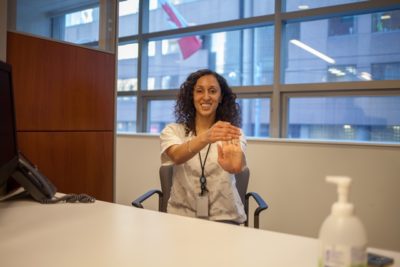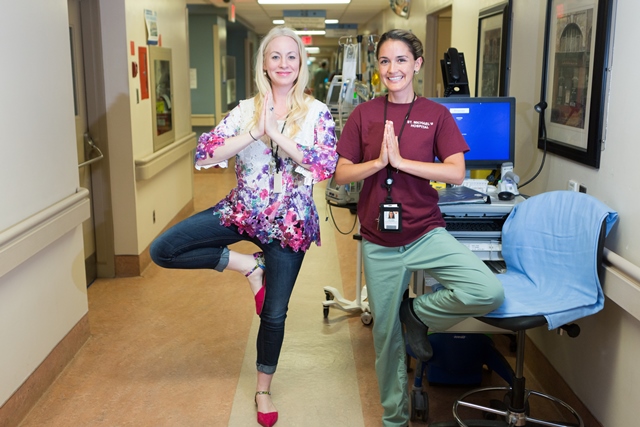By Emily Holton
A new, one-year certificate program at St. Michael’s Hospital offers clinical and administrative staff a different kind of professional development: how to support one’s own wellness.
“To me, wellness is not just about the absence of disease,” says Shivalee Paliwal, the performance and wellness consultant leading the program. “I’m talking about helping people reach their full potential for physical, mental and social well-being.”

Paliwal believes that when staff’s wellness improves, so do organizational outcomes – it’s in everyone’s best interest to nurture wellness at work. Her goal is to equip staff with the tools to better navigate stress, improve their physical and mental health and have stronger social interactions.
She began with weekly “chair yoga” and lunch-hour guided-meditation sessions in spare meeting rooms.
“I put the call out in our staff newsletter, hoping at least one or two people might show up,” says Paliwal. “It’s been so exciting to see such a great turnout every week, and a clear desire among staff to explore these topics more deeply.”
In response, Paliwal has developed the I Am Wellness certificate program. It’s a series of 10 workshops offered to staff free of charge through St. Michael’s Human Resources and Corporate Health and Safety Services. Topics include breathing and posture, meditation and mindfulness, building resilience and cultivating gratitude.
Participants can join as few or as many sessions as they wish, but those who participate in all 10 sessions will receive a certificate of completion.
A homework component is central to each workshop. It asks participants to pick a daily, personal practice and stick to it for 30 days. Examples include five minutes of deep breathing, or a few pages of journal writing.
“It’s about forming habits,” says Paliwal. “People vary largely in how long it takes them to stick to something, but 30 days is long enough to see impact and help them decide how they want to proceed afterwards.”
A similar St. Michael’s initiative is evaluating a toolkit of wellness techniques and approaches designed specifically for nurses. The ARISE project offers in-hospital workshops, online sessions and a closed Facebook support group to see if they can enhance resiliency for up to 40 trauma and acute care nurses.
The self-care topics are taught by St. Michael’s clinicians with special interest in supporting workplace wellness.
“ARISE was built within St. Michael’s, with our people and for our nurses,” said Orla Smith, an associate scientist at the Li Ka Shing Knowledge Institute of St. Michael’s Hospital and the clinical leader manager for the Cardiovascular Intensive Care Unit. “Because the project is tailored to our nurses it understands and reflects the context of our mission, values and patients. It was designed for the reality of the bedside nurse and their unique needs related to health and wellness.”
Like the I Am Wellness program, the ARISE program focuses on self-care and stress-relief techniques such as yoga and mindfulness.
“This concept of wellness is so often misunderstood,” said Paliwal. “Many believe it’s something for people with too much time on their hands, or a hobby to pursue after work. However I’ve seen how transformative these practices can be, no matter who you are or what your lifestyle may be. Everyone can benefit.”
Emily Holton is a Senior Communications Advisor at St. Michael’s Hospital.




